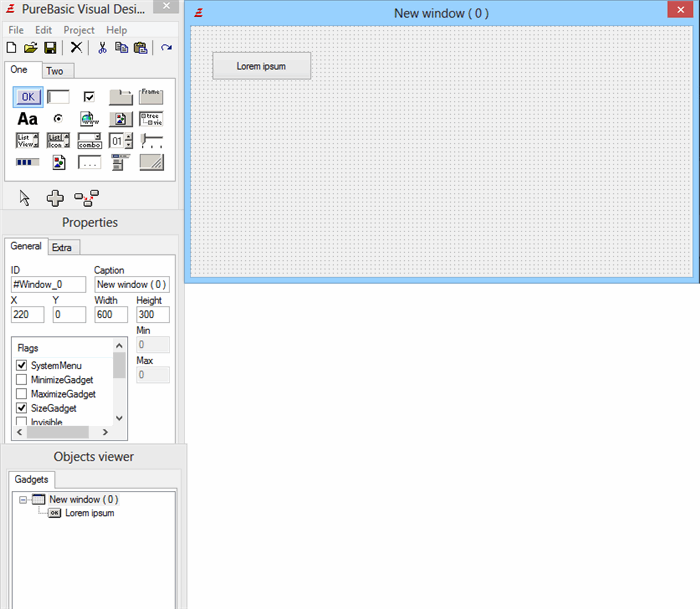

- Purebasic examinedirectory 64 Bit#
- Purebasic examinedirectory software#
- Purebasic examinedirectory code#
- Purebasic examinedirectory license#
- Purebasic examinedirectory free#
Note: Len(String) used to count the length of a string will not exceed the first null character ( Chr(0)).s - strings.ĭepending on the ratio of the decimal number. q (integers - from single-byte and 8-byte). Variable data type specified when you first use it (and optionally - in the future), and is separated from the name of the point. However, numerous users have created object oriented support systems. Note that PureBasic does not escape double quotes in strings so these must be concatenated with Chr(34).įred, the developer of PureBasic, has stated that PureBasic will never be object oriented. Create Window: OpenWindow ( 0, # PB_Ignore, # PB_Ignore, 800, 600, "Simple Text Editor", # PB_Window_SystemMenu | # PB_Window_MinimizeGadget | # PB_Window_MaximizeGadget | # PB_Window_SizeGadget ) Add 2 menus: CreateMenu ( 0, WindowID ( 0 )) MenuItem ( 1, "&OK" ) MenuItem ( 2, "&Cancel" ) Add Editor: EditorGadget ( 0, 0, 0, 0, 0 ) SetGadgetFont ( 0, LoadFont ( 0, "Courier New", 10 )) Process window messages until closed: Repeat Select WaitWindowEvent () Case # PB_Event_Menu Select EventMenu () Case 1 : MessageRequester ( "OK clicked directly or with '&' mnemonic.", GetGadgetText ( 0 )) Case 2 : Break EndSelect Case # PB_Event_SizeWindow : ResizeGadget ( 0, 0, 0, WindowWidth ( 0, # PB_Window_InnerCoordinate ), WindowHeight ( 0, # PB_Window_InnerCoordinate )) Case # PB_Event_CloseWindow : Break EndSelect ForEver
Purebasic examinedirectory code#
The following single line of PureBasic code will create a standalone x86 executable (4.5 KiB (4,608 bytes) on Windows version) that displays a message box with the text " Hello World". It can compile console applications, GUI applications, and DLL files.

The compiler produces native executables and the syntax of PureBasic is simple and straightforward, comparable to plain C without the brackets and with native unicode string handling and a large library of built-in support functions.

The AmigaOS version is legacy and open-source. Currently supported systems are Windows, Linux, macOS.
Purebasic examinedirectory 64 Bit#
PureBasic is a native cross platform 32 bit and 64 bit BASIC compiler. Other 3D environments such as the Irrlicht Engine are unofficially supported. PureBasic supports and has integrated the OGRE 3D Environment. PureBasic supports inline assembly, allowing the developer to include FASM assembler commands within PureBasic source code, while using the variables declared in PureBasic source code, enabling experienced programmers to improve the speed of speed-critical sections of code. Programs developed without using the platform-specific application programming interfaces (APIs) can be built easily from the same source file with little or no modification. PureBasic compiles directly to IA-32, x86-64, PowerPC or 680x0 instruction sets, generating small standalone executables and DLLs which need no runtime libraries beyond the standard system libraries.
Purebasic examinedirectory free#
As cited on the website, the first PureBasic user (who registered in 1998) still has free access to new updates and this is not going to change.
Purebasic examinedirectory license#
PureBasic has a "lifetime license model". It has been continually updated ever since.

The first public release of PureBasic for Windows was on 17 December 2000. An Amiga version is available, although it has been discontinued and some parts of it are released as open-source.
Purebasic examinedirectory software#
PS: I think that the documentation ought to mention "." and "." on Win, and other similar cases on other OSs, so users can keep it in mind for cross-platform code's sake.PureBasic is a commercially distributed procedural computer programming language and integrated development environment based on BASIC and developed by Fantaisie Software for Windows, Linux, and macOS. Probably the best solution would be to have a collection of different PB examples/procedures to pick from to handle this (ie: cross-platform, platform-dependent, etc.).Ībout the "." and "." entries found on Windows, are there similar equivalents on Linux and Mac? In my code I already handle "." and "." on Win OS, but I was wondering if and what to except on Mac (which I don't have access to) in order to make it cross platform. So, any cross-platform code will have to take in account that on Win when retriving file/folder paths.įrom this thread it seems like there can't be a single solution to fit all needs. Windows will accept "/" as a path separator, but any commands dealing with file paths will always return "\" as a separator because it's Win default. No need to use a compiler directive to pre-select a '/' character or a '\' character, depending of the OS. Olliv wrote:2nd remarkIt seems that '/' is cross-platform.


 0 kommentar(er)
0 kommentar(er)
